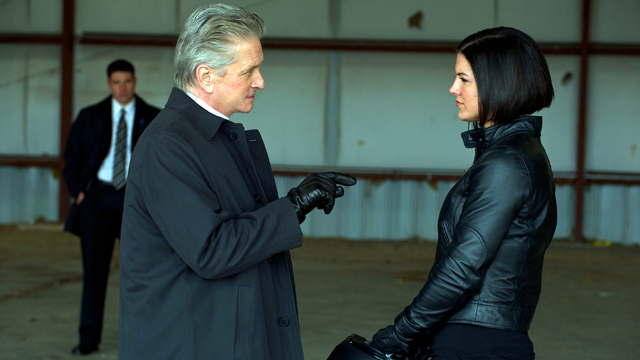
I for one hope that Steven Soderbergh never retires. He’s been going back and forth about it for a couple of years now, being vague and ambiguous as only one of Hollywood’s most idiosyncratic and eccentric filmmakers can. But as one of the few filmmakers who constantly puts out fascinating work (even when it’s not particularly “great” work), Soderbergh is an artist whose absence would be felt if he called it quits.
His latest film is Haywire, a slick, smarty-pants action thriller that isn’t quite the companion piece to the excellent The Limey (which screenwriter Lem Dobbs also wrote) that I was hoping it would be but is still head and shoulders above most of the action fare that’s out there (and that costs about four times as much). The film follows Mallory Kane (Gina Carano), a contract killer and former Marine who goes on the run when she’s marked for death by seemingly everyone on the planet after she rescues a Chinese journalist being held prisoner in Barcelona. Good thing she knows how to punch, kick, smash, cut, leap and shoot herself through almost every tight spot and situation.
Her colleagues (and perhaps enemies) are many, including Aaron (Channing Tatum), an occasional partner and casual lover; Kenneth (Ewan McGregor), her handler and former boyfriend; Paul (Michael Fassbender), a freelance agent with whom she “dates” while undercover on an assignment (are you seeing pattern here? Sex is dangerous!); Rodrigo (Antonio Banderas), a mysterious businessman who just reeks of conspiracy; and Coblenz (Michael Douglas), the aging government suit who seems rather anxious to get on with Kane’s demise. Along the way, she gains something of a sidekick in Scott (Michel Angarano), whose car she hijacks as she’s making a great escape, and we get to meet dear old dad (Bill Paxton), who’s beamingly proud (and a bit in awe) of his little girl.
Haywire has something of a convoluted plot, but its unique Soderberghian structure and pacing makes it so that you barely notice. The film is, first and foremost, a lean, mean and hot-blooded showcase for MMA star Carano, who delivers a magnetic performance that is refreshingly devoid of the kind of stoic, almost bored attitude that comes from other female action stars. When someone she thought was an ally suddenly takes a swing at her, she reacts with surprise and heartbreak (and, of course, a counter-punch). Soderbergh has also created a very realistic and physical world for her to inhabit; when she takes a hit, you feel the bone-crunching impact — and, super-training be damned, sometimes it takes her a little while to get back on her feet.
The all-star supporting cast is, of course, a lot of fun, though they’re ultimately little more than human punching bags. And that’s completely fine; Haywire is an exercise in form and style, not plot and characterization — and, on that level, it succeeds brilliantly. There’s a real adrenaline-pumping excitement to this film, even if, like many of Soderbergh’s lower-budget digital experiments, it all seems vaguely self-conscious with very little at stake. It’s a blast, but it’s definitely completely aware that it’s a “movie” — and, despite its strong sense of real physicality, one fueled by a deep sense of fantasy.
Check it out. No one can frame a shot like Soderbergh (working once again as his own cinematographer under the name “Peter Andrews”), and no one can edit together a sequence (whether it be a dialogue exchange or an action scene, or suddenly both at the same time) quite like him, either. He may not hit the bull’s-eye every time (and Haywire is ultimately not quite up to the level of his best works, Out of Sight and The Limey), but he’s one of the few filmmakers that doesn’t give a bad connotation to the term “interesting.” And watch out for that Gina Carano — she just might become a movie star.
Comments
Haywire Review